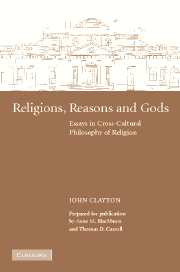Book contents
- Frontmatter
- Contents
- Editorial preface
- Acknowledgments
- List of abbreviations
- 1 Claims, contexts and contestability
- PART I REASON AND RELIGIOUS PLURALISM
- PART II THEISTIC ARGUMENTS IN PRE-MODERN CONTEXTS
- 5 Ramanuja, Hume and ‘comparative philosophy’: remarks on the Sribhasya and the Dialogues concerning Natural Religion
- 6 Piety and the proofs
- 7 The otherness of Anselm
- PART III THEISTIC ARGUMENTS IN EARLY-MODERN CONTEXTS
- Appendix: The 1997 Hulsean Sermon
- Bibliography
- Index
6 - Piety and the proofs
Published online by Cambridge University Press: 22 September 2009
- Frontmatter
- Contents
- Editorial preface
- Acknowledgments
- List of abbreviations
- 1 Claims, contexts and contestability
- PART I REASON AND RELIGIOUS PLURALISM
- PART II THEISTIC ARGUMENTS IN PRE-MODERN CONTEXTS
- 5 Ramanuja, Hume and ‘comparative philosophy’: remarks on the Sribhasya and the Dialogues concerning Natural Religion
- 6 Piety and the proofs
- 7 The otherness of Anselm
- PART III THEISTIC ARGUMENTS IN EARLY-MODERN CONTEXTS
- Appendix: The 1997 Hulsean Sermon
- Bibliography
- Index
Summary
Religious piety and proofs of God's existence have not in modern times invariably sat so happily beside one another as the attempted euphony of my title may at first appear to suggest.
In the seventeenth and eighteenth centuries, the existence and nature of God came to be conceived as a purely philosophical question that could be answered, if at all, without recourse to ‘narrowly religious’ considerations. Philosophers and sympathetic theologians agreed that a religiously independent philosophy is itself competent to demonstrate the Deity's existence and nature by means of formally valid and generally convincing rational proofs.
Motives varied. Some philosophers may have desired that a common rational religion would eventually displace the diverse ‘positive religions’, which – as the then recent religious wars in Europe and the invasion of the Turks from the South had shown – tend toward divisiveness, intolerance and bloodshed. Some Jewish thinkers may have hoped via a confessionally neutral ‘rational theology’ to win an equal place within Europe's intellectual mainstream. And a few Christian theologians may have joined in the ‘Enlightenment project’ – as it has been called – in the belief that ‘natural theology’ itself already contained the best that is in Christianity, whilst others may have been confident that the independent foundation would be sufficient to support a robustly Christian superstructure.
- Type
- Chapter
- Information
- Religions, Reasons and GodsEssays in Cross-cultural Philosophy of Religion, pp. 133 - 160Publisher: Cambridge University PressPrint publication year: 2006



